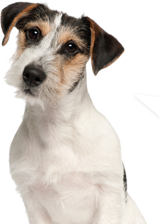Mouthiness and Play-biting in Puppies
Ages 5 months and under
Play-biting and mouthing are normal behaviors for puppies, as they are genetically programmed to explore the world with their mouths. But it is important to redirect the puppy to toys and other appropriate objects and discourage them from mouthing hands, arms, or clothing.
How to reduce mouthing and play-biting:
 When your puppy begins to mouth you, calmly stand up, withdraw attention, and remove yourself from the environment. This may mean that you need to leave the room for a minute. Once your puppy is showing calm behaviors, you can continue to interact. You will need to consistently repeat this while your puppy learns that putting their mouth on you means the attention stops, and that appropriate play keeps the fun going.
When your puppy begins to mouth you, calmly stand up, withdraw attention, and remove yourself from the environment. This may mean that you need to leave the room for a minute. Once your puppy is showing calm behaviors, you can continue to interact. You will need to consistently repeat this while your puppy learns that putting their mouth on you means the attention stops, and that appropriate play keeps the fun going.- Start to watch for what triggers the mouthing. Is it in response to you touching them in a certain spot, like their head or ears? Does it happen during a certain game or play style? Is it occurring when the puppy is tired?
- DO NOT practice aversive suggestions, such as holding your puppy’s mouth closed or rolling them on their back and holding them down (often referred to as an “alpha roll”). These methods risk damaging your relationship with your puppy and can result in new or escalated behavior problems.
- DO NOT let out a high-pitched “yelp” when your puppy bites you. This suggestion was popular as a way to simulate the sound their littermates make to communicate pain during play, but it actually causes many puppies to get more excited and aroused, resulting in increased biting.
- Avoid any roughhousing, wrestling, or pushing and shoving games with your puppy. These activities encourage more biting and inappropriate behavior.
- Encourage non-contact games, such as fetch or hide-and-seek. You can also play a gentle game of tug-o-war, making sure use cues like “tug” and “drop” to set healthy boundaries and consistent rules during play. Tug-o-war does not make dogs aggressive nor dominant, and you do not always have to win.
- Redirect your puppy’s mouthiness to appropriate objects. Keep a stash of plush toys and chews around the house that your puppy can mouth instead of your body parts. Try to anticipate your puppy’s mouthing and offer them an appropriate item before they have a chance to mouth you. If they initially go for the item but then come back to your body, introduce a new toy to keep their interest and redirect them from mouthing you.
- Provide your puppy with plenty of mental enrichment. Having a freezer full of frozen, stuffed KONGs and other food toys or puzzles on hand is important. These items help mentally enrich your puppy, tire them out, and allow them to use their mouths on appropriate items.
- Provide your puppy with plenty of rest. Growing puppies require 16-20 hours of rest per day. Puppies who do not get enough sleep are like toddlers who need a nap. When your puppy is overtired, they may begin to chew on inappropriate items and mouth and bite more often.
- Always supervise children and young puppies. Identify the less mouthy times of your puppy’s day and allow that to be playtime for the children and puppy together. Teach children to always have a toy in each hand to encourage proper interaction. It is also helpful to provide your puppy with extra exercise before interacting with children so they can burn off extra energy and feel more regulated around the kids. If mouthing does occur, an adult should be present to redirect the behavior, and children should leave the room as needed to end the interaction. Also, be sure to teach your children how to properly respond using the tips above if your puppy does begin to mouth them.
- Bitter Apple is a product that can be sprayed on human hands, feet, or clothing. It’s designed to taste bad and thus discourage the puppy from putting their mouth on that object. NEVER spray bitter apple directly in the puppy’s mouth! Bitter Apple can be purchased from the retail store at the Wisconsin Humane Society and 100% of proceeds benefit the animals in our care.
- Enroll your puppy in training classes at an early age. The Wisconsin Humane Society offers classes specifically for puppies under 5 months of age to teach owners the basic framework for raising a well-mannered pooch.
Additional Resources
- If you are seeking additional support, contact our Behavior Line at 414-431-6173 or behavior@wihumane.org
- Visit www.wihumane.org/behavior/canine-manners-classes for available dog training classes that we offer.
- Visit www.whole-dog-journal.com/training/tricks_games_sports/ for more information on the benefits of tug of war and how to create appropriate rules.
